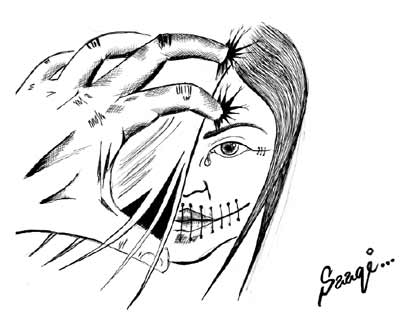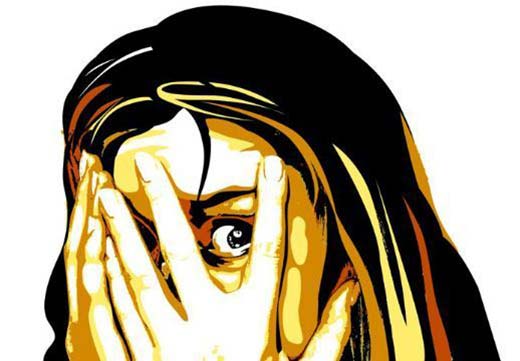Though a criminal offence with a punishment that can go up to three years of imprisonment, young women in Kashmir silently face harassment on streets and buses and survive with scars for life, reports Syed Shadab Ali Gillani
One evening, about a month ago, Seema (name changed) had a disturbing experience while returning from work. She encountered something that deeply unsettled her, prompting her to hasten towards her home. However, just as she was about to enter her house, she was stopped abruptly, leaving her inconsolable for days. She calls it a “living nightmare” that shall remain etched on her memory forever.
For twenty-five-year-old Seema, the experience of street harassment has sadly become all too familiar. “I have seen so much of it that, unfortunately, I have grown accustomed to it,” she said with a shrug of her shoulders. “Though I know it’s wrong to say this, street harassment has become a routine in my life.”
Seema vividly remembers her first encounter with street harassment at the tender age of thirteen. “I was constantly followed by this notorious boy, who was five years older than me,” she recalled. “He made it extremely difficult for me to move around, and it was a truly dreadful experience.”
Walking the streets fills Seema with an overwhelming sense of insecurity, always fearing that she is being followed. “I constantly find myself looking over my shoulder, mentally drained as I expend every ounce of energy,” she confessed, insisting it has taken a toll on her well-being.
In her quest for support, Seema attempted to confide in her family, but their response was consistently dismissive: “Just ignore such things,” they would say. “My parents always advise me not to pay much attention to such people.”
Seema strongly believes that incidents of street harassment should be reported rather than brushed aside. “Parents must engage in open conversations with their daughters,” she stressed. “These incidents take a significant toll on women’s mental health, particularly teenagers who are more vulnerable to such encounters.”
A Pervasive Issue
Street harassment is a pervasive issue that plagues societies around the world, leaving a trail of shattered confidence and emotional scars. From catcalling and lewd comments to unwanted touching and stalking, women have endured the brunt of this behaviour. It fosters a culture of fear, erodes personal safety, and limits the freedom of movement for its victims.
Besides, it perpetuates a society where respect and dignity are compromised, affecting mental health, self-esteem, and overall well-being. Combating street harassment requires comprehensive education, societal awareness, and a collective commitment to fostering safe and inclusive public spaces.
Seema had become a victim of the prevalent issue of street harassment. In Kashmir, incidents of catcalling, eve-teasing, and street harassment have been increasingly common. Women, especially young girls, find themselves targeted by men who make obscene remarks, comments, gestures, hoot, whistle, and, at times, even touch them without consent.
An Uptown Epicentre
Regrettably, Seema’s story is not an isolated one; women in Kashmir face various forms of harassment daily. Raima (name changed), endures daily street harassment that severely impacts her self-esteem.
Raima, a sixteen-year-old student from Srinagar’s Natipora area, has unfortunately become a frequent target of relentless street harassment. Each encounter affects her deeply, often leaving her emotionally affected for days.

As a student in eleventh grade, Raima endures the unwelcome attention of boys in her classroom. “My classmates often follow me home, not only from school but also from tuition classes. Parraypora seems to be the epicentre of such incidents,” she revealed.
The consistent instances of harassment have made Raima prefer staying home “most of the time.”
Her experiences have been “extremely unpleasant,” and she wishes for greater awareness regarding the consequences of such harassment.
Lifelong Scars
Similar to Seema and Raima, numerous women express their grievances about street harassment and its detrimental impact on their mental well-being.
“Many people believe that street harassment is harmless, but trust me, it is not,” asserted Samah, a twenty-year-old woman. “It leaves lasting scars on our mental health and self-esteem.”
Samah often finds herself lacking confidence, uncertain about whom to blame. She questioned, “Is it because of my clothes? Or my appearance? Or simply because I am a girl? These questions frequently plague my mind.”
Samah and others like her tend to internalise blame for the harassment they experience.
Street harassment frequently leads to suicidal tendencies and self-harm among girls. Saba, a twenty-two-year-old, has been tormented by a persistent stalker for the past eight to nine years, pushing her to attempt self-harm on multiple occasions.
“No matter how many times I reject him, this person continues to stalk me relentlessly,” Saba lamented. “He even contacts my father and loiters outside my house. He has made my life unbearable, often making me question my existence.”
Due to the emotional turmoil, she faces, Saba is receiving psychiatric help. The continuous harassment has left her emotionally fragile and reliant on others for support. Distraught, Saba explained, “I have become incredibly vulnerable due to enduring this from such a young age. When it started, I was just a child. Initially, I hoped it would fade away over time, but it only grew more difficult with each passing day. Now, I often ask my brother or mother to accompany me.”
Despite multiple warnings from Saba’s father, the boy persists, and involving the police is not a viable option, as Saba claims she would likely face interrogation. “I don’t want to subject my daughter to that,” her father asserted.
These encounters have long-lasting effects, often leading to depression and anxiety.
Discouraging Society
Sheema, now in her thirties and working as a teacher, expresses her dismay over the societal attitudes that perpetuate such incidents due to a lack of action.
She recalled an incident from her college days over fifteen years ago when she and her friends faced harassment on a bus. When they finally raised their voices against the perpetrators, they were met with denial and counter-accusations of seeking cheap publicity. Sheema and her friends were appalled when an elderly woman and another man chimed in, saying, “Yim chi asaanyithii“.
Overwhelmed with sadness, they disembarked in an unfamiliar location, choosing to walk an additional 5 kilometres rather than risk further trauma by boarding another bus.
Even minors harass adult women. “I am almost 25 years old and I was harassed and followed by a boy who must have been hardly 18 on the eve of this Eid,” a working woman said. “It surely was disturbing because this was a kid harassing me. I looked down and walked towards my home.”
Daily Struggles
Street harassment is a demeaning form of sexual harassment that employs derogatory words and gestures with underlying double meanings. Its impact on women’s mental health is profound and far-reaching.
This form of harassment encompasses actions, remarks, and comments infused with sexism, misogyny, and male dominance, all of which are inherently sexual. Women often exhibit visible discomfort in response to such acts.
The National Family Health Survey (NFHS) conducted in 2019-2020 revealed that 9.6 per cent of women aged 18-49 in Jammu and Kashmir experienced domestic violence during that period.
According to the NFHS, 1,046 rape cases were registered in Jammu and Kashmir in 2019-2020.

The National Crime Records Bureau (NCRB) report published in September 2021 highlighted a 15 per cent increase in gender-based violence in Kashmir compared to the previous year. In 2021, there were 3,405 cases of crime against women recorded, while 33,937 cases were recorded in 2020.
The NFHS data showed that there were 352 registered rape cases in Jammu and Kashmir in 2014, with numbers fluctuating over subsequent years before rising to 359 in 2018.
As of March 2019, 1,046 rape cases were under trial in Jammu and Kashmir, with 831 cases pending since 2014. Among these cases, 820 involved victims who were minors.
The NFHS 2021 report indicated that 11 per cent of married women in Jammu and Kashmir experienced physical or sexual violence, with husbands being the typical perpetrators. Previous reports in 2015-16 and 2005-06 showed percentages of 12 per cent and 13 per cent respectively.
According to the NCRB report for 2021, there were 1,851 cases of assaults on women to outrage their modesty, 315 cases of rape, and 1,414 cases of attempted rape reported. The report also stated that 91.4% of the accused involved in rape were known to the victims.

A Crippling Impact
According to Asma Nasir, a counsellor at the Department of Psychiatry, Government Medical College (GMC) Baramulla, women encounter street harassment daily, leaving a profoundly negative impact on their mental well-being. Anxiety and depression are common outcomes of such experiences.
”It erodes their confidence, leading them to blame themselves for the perpetrators’ behaviour,” Asma said. “They alter their walking routes and may even change jobs or relocate, all of which amplify stress levels and exert an overall negative effect on mental and physical health.”
Street harassment is a criminal offence with legal provisions for punishment. Advocate Syed Sibtain Geelani, a practising lawyer at the District and Sessions Court Baramulla, emphasised that all forms of street harassment carry penalties.
“We regularly organise awareness programmes about street harassment in colleges and schools to ensure that people, especially women and students, gain a comprehensive understanding of this offence,” Geelani stated. “Many individuals consider such acts to be normal, but they are, in fact, punishable offences.”
Geelani further explained the existence of laws and sections specifically addressing this offence. Following the 2013 amendment act, three sections were introduced: “Under these sections, if a woman believes she is being harassed, she can file a complaint against the perpetrator,” Geelani clarified.
“The punishment for such offences can range from imprisonment up to three years, fines, or both,” she said. “In cases where an individual exhibits a pattern of such activities, the punishment can be extended to five years or more,” she emphasized. “Even continuous staring now constitutes a punishable offence.”
Geelani highlighted the various sections that cover different gestures or offences falling under the umbrella of street harassment, such as stalking, groping, listening to obscene materials, sharing, watching, staring, and more.
Even Men Suffer
Street harassment is a form of sexual harassment and not just women but men too are becoming a target of different kinds of harassment. Even teenagers face the crisis.
Many men are coming forward to share their ordeals. One such incident was shared by a Kashmir man on his Twitter handle. The man wrote about his experience of “sexual harassment” at the hands of an older man in a public vehicle. In his tweet, he also made a request to the women to avoid boarding a bus if it is crowded.















